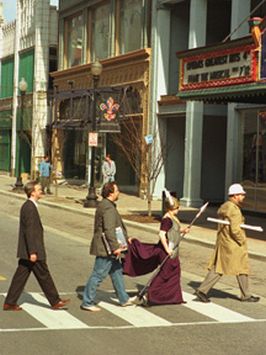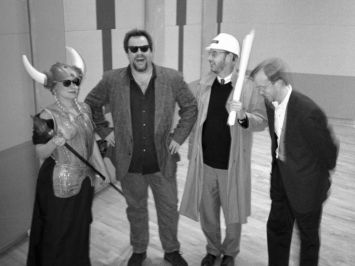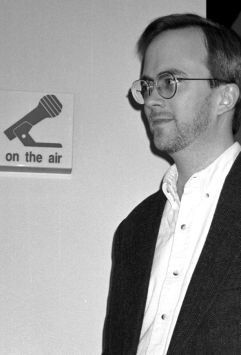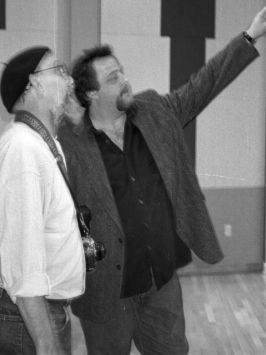social bookmarking tools:
 |
|
| Available RSS Feeds |
|---|
 - Top Picks - Top Picks |
 - Today's Music - Today's Music |
 - Editor's Blog - Editor's Blog
|
 - Articles - Articles
|
Add Louisville Music News' RSS Feed to Your Yahoo!
|

VOICES FOR THE CITY: THE PUBLIC RADIO PARTNERSHIP
"These are times of great world stress. As never before it is urgent today that a free people have the most prompt access to broad areas of knowledge – knowledge which places today's culture in its rightful context against the past and reveals to the present its own stature. Our new radio unit. . .can become a vital community agency for social cultivation and strength."
-- Clarence "Skip" Graham,
Director, Louisville Free Public Library
Co-Founder, WFPL/WFPK
Read during WFPL's first broadcast,
9:00 p.m., February 18, 1950
Monday Morning, January 8, 1996 – Louisville wobbled into another workweek from under a winter storm that had struck on Saturday. The city was luckier than it had been two years before when a larger storm – with deep snow and temperatures cold enough to freeze hair – paralyzed it for two days. A lesson was learned. Since then sand and salt trucks sit idling in the shoulders of interstates at the first forecast of snow.

But even though that morning's traffic moved slower, drivers skidded out of their neighborhoods, and area schools either opened late or not at all, the weather did not stop a quiet transformation never before known in the history of Louisville broadcasting. Three years of planning, discussions, turf skirmishes, discomfort, and deals all unfolded into an entity that became a model for the future of public broadcasting in America and gave public radio listeners in Louisville three distinct, yet somewhat interrelated, programming voices from a single source.
The Public Radio Partnership (PRP) began its first broadcast day as a new entity.
Depending on where your radio dial was positioned at 6 that morning, you may have heard:
The opening theme music for National Public Radio's (NPR) Morning Edition on WFPL, which had converted its programming to an all-news, -conversation, -information, and -drama.
Tom Fenn beginning his program with the Chicago Symphony's performance of "Dawn and Siegfried's Rhine Journey," from Wagner's Gotterdammerung on WUOL, now the only 24-hour classical music station operating within a 100-mile radius of the city.
And Laura Shine spinning the unofficial anthem for the partnership – "The Future's So Bright, I've Gotta Wear Shades," an innocent, catchy song by The Kennedys – on WFPK, which made the bold move to an Adult Album Alternative (AAA) format that blended little-heard music from dozens of singer-songwriters and rock performers who rarely break into the Top 40 with the standard public radio sounds of jazz, folk, Bluegrass, and blues.
Still included in that mix at WFPK are generous portions of Louisville music in regular rotation. Even though some selections performed by the city's jazz and classical musicians did make it onto the air when WFPL had music as part of its programming and WFPK and WUOL were scrapping over the classical audience, local music had not had such an outlet in years. At least not since the innocent days of WAKY and WKLO, or even the original WLRS when it put local music on its Homemade Album projects and occasionally spun a song or two from them. This was years before AM radio became a 24-hour yackfest and FM became home to sex jokes during morning drive time and jackhammering repetitions of the same songs from a corporate programmer's playlist.

Exciting things were happening on the left side of the FM dial for area musicians and those who wanted something other than songs from boy bands and greasy attempts at wit shoveled at them for hours at a time. Radio was becoming fun again.
Now that the fun's been going on for four years, the partnership has a new place to play – their programs and music, that is. The PRP had raised almost $5.2 million in a lengthy capital campaign to thoroughly renovate an old, fire-gutted building that was originally a home office for the Kentucky Electric Company. It then housed a succession of businesses before it outlived any structural usefulness as home to a blood plasma donation center. Money from the fund also went to purchase new broadcast and production equipment, an infrastructure of new cabling, a computer network, and office furniture.
Now ready for service, the renovated and renamed H.S.A. Broadband Building, two doors north of The Palace Theater on Fourth Street (and across from the building containing the local radio stations of Cox Broadcasting), contains six production studios, a control room for each station, full suites of offices for their staffs, and a large performance studio that each station plans to use.
"This has been a very difficult, complex, at times tension-riddled, but eventually extremely satisfying project," said Gerry Weston, president of the partnership and general manager of WFPL/WFPK. That was his summary of the entire PRP story, from the first concept of merging the stations all the way to the first day of operations from the new building.
Originally hired in 1980 to develop jazz programming for WFPL, then named general manager of Library Broadcasting in late 1985 (when the City of Louisville held the licenses and the two stations were a division of the Louisville Free Public Library), the 47-year-old Weston appears to treat public radio as a calling. Tall and relaxed with thin hair and a full beard, glasses, and a butter-smooth announcer's voice, the native of Hingham, Massachusetts has made his career out of shepherding a pair of city-owned stations through the process of becoming, with a third, an exponent of Louisville itself.
"We had some critical things happen along the way," Weston continued, "and at every critical juncture, when the project could have easily fallen apart, the [PRP Board of Directors] decided to keep its vision above the horizon, to where we need to be going rather than get sucked into turf wars. Transferring all three licenses was not easy. We had some convincing to do. Changing the formats was politically very hard. Although, looking back on it, I claim it's the smartest thing we could ever have done."
"I'm one of the people who's thrilled," said Fadel Friedlander, evening classical music producer and host at WUOL, about the format change. "I think we're serving each audience much better than we did before. We're making all three formats accessible."

She sat behind the control board at WUOL bounded by transmitter racks on her right, a desk with telephones on her left. Microphone booms spiderlegged down toward us. The walls were covered in a mouse-brown carpet. Yellowing papers were tacked to panels of thin cork. She played a recording of Henry Gorecki's Symphony No. 3 over the air. The opening movement's slow beauty flowed from the monitor speakers and added to the mechanical warmth already in the room. Her brown and black mink coat hung from a corner of the satellite transponder rack behind us. The studio's florescent light cast a shimmering whiteness in her short blonde hair.
A former opera singer deeply educated in classical music, clearly demonstrated in the trills she puts into Italian composers' names when she says them, Fadel glows with enthusiasm for the PRP and its classical music mission.
"It's amazing," she whispered. "The changes. . .amazing! Everybody's so excited. That's what's so great about it. Not to mention our ability with the performance studio to have some live performances. We'll be able to tape from different venues – the music school, the Palace Theater, the Brown Theater. It's going to make a huge difference."
Since the University of Louisville added it to the city's airwaves in 1976, WUOL had been hornlocked in competition with WFPK over the city's small classical music audience. By then WFPK had been playing classical music for 22 years and had been the only classical station in Louisville for most of them (anyone remember WHAS-FM before its altered-ego state of WAMZ?).
"I think that was a mess," Friedlander said. "It was just dividing the audience. And I think if you listen at lot to UOL, you will find what's to your taste. We have really not left anybody out and we have the ability to do specialty shows." She spoke of Alan Brandt's "Clef Notes," a program of modern music called "In a Different Key," and her own show on opera. "We're hitting everything," she said.
"The biggest benefit we got [from the station merger] was cornering the classical music audience," said Bill Underwood, WUOL's program director and manager of operations for the PRP. "We're the last man standing, so to speak."
Tall, matchstick slender with glasses and gray hair cut close to the scalp, Underwood leaned back in his chair. His small office in Strickler Hall at the University of Louisville was choked with stacks of paper and books. A large Compaq computer swallowed the space on a corner of his desk. "Louisville was in an absolutely unique situation of having two full-time classical music stations for about 20 years. It was economically and financially unworkable. Neither station got the full support in terms of finance or listener support. Yet we were having to fund and operate two stations. Listeners had wonderful benefits from this, but the stations were slowly sort of strangling each other financially.

"The great benefit of the merger is that we inherited all the classical music listeners not only in Louisville but in the whole Kentucky and Southern Indiana area."
The connection with the U of L's school of music made WUOL the clear choice as the classical arm of the PRP. Despite the license transfer, the station will still have connections to the university. It will maintain a remote studio on campus and a direct transmission line from the school of music, plus one-third of the PRP's board of directors represents the university.
One down. Two to program.
WFPL's schedule was getting schizophrenic. News from NPR, the BBC, and other sources, Jazz in the afternoon, then topical discussion programs, more news, book readings, more jazz, New Age overnight, then back to news at 6 a.m. to repeat the cycle. Weekends it was mostly the same with slightly more emphasis on the music. This first-born of the PRP triad spent its early years as "educational radio," where listeners tuned in for French lessons, a lecture on neutron stars, someone reading children's stories, and several pieces of classical music. WFPK absorbed the mission to bring classical music to the city when it was created in 1954, leaving the "L" to focus on bringing news, information, drama, old radio shows, comedy – anything that talked about something – to the audience.
While WFPL's is now mostly focused on providing news and discussion, it still remains connected peripherally to music. "We are trying to get better about letting our listeners know about the music on the other two stations," said station program director John Gregory. "For instance, when "Morning Edition" does a profile of a classical music artist, we'll try to mention to listeners about the classical music available on WUOL."
The 35-year-old Gregory, who started at the station as a volunteer answering telephones during a 1985 pledge drive and simply never left, was named to his position ten years later, before the merger of the three stations. "Even though we are a talk station," he said, "there is a good amount of music on WFPL: within the news programs, on the weekend with "A Prairie Home Companion" – which features a good bit of music –, "Riders Radio Theater," and on Sundays with a program called "Sound and Spirit."
"We have, on occasion, been questioned on why we have "A Prairie Home Companion" on WFPL and not WFPK, or even "Anthem," a show NPR cancelled. My philosophy is that there is a significant portion of those shows that include conversation. But those shows are being presented as a way to introduce people to different kinds of music. Listening experiences are great – that's why WFPK and WUOL are so popular – but we were able to take that and add a layer of information to help people enhance their listening experiences."
It's schedule now filled with 24 hours of informative programming, ranging from world news to car repair and civilized conversation driven by ideas instead of glib personalities, WFPL has returned to its chartered purpose, but without the French lessons. As Gregory stated, some programs include information about music and musicians. WFPL can use them to introduce its audience to the other two stations.
In that way, WFPL is a matchmaking service that fixes you up on the ultimate blind date. If it works out, wonderful! If it gets drunk or flosses its teeth at the table during dinner, you never have to go back again.
* * *
A few years after Gerry Weston worked jazz into the programming in 1980, the station took a few more adventures with music choices. Scott Mullins created "The Saturday Night Blues Party" (still running and on now WFPK). A new edgy style of music – first vaguely labeled "college-radio rock," then "alternative," then "mainstream" – was featured on "The Flipside," which followed the blues show (and later hosted by Cary B. Willis, who has a Saturday morning show on WFPK). Singer-songwriter material and songs that never found a home within contemporary radio formats were played on "Audioasis," created and first hosted by Joe Vincenza, then later hosted by WUOL's Alan Brandt.
The music was being squeezed tightly against the talk. The laws of thermodynamics were impinging on radio programming: something had to be displaced. And with so many possibilities, which would be the music of choice?
"We knew right off the bat that there was not enough support to make a full-time jazz station," said Leslie Stewart, former program director of WFPK and architect of the format now heard on it. "I don't think I could have ever convinced the board [of that]," she said in a telephone interview from her home. "They wanted to make sure we were gonna have a format that Louisville would support because financial support is a big part of the picture. There was no way I thought that was going to happen with jazz. I had to go with a format would have a high probability of success."
Now a part-time producer and show host for the PRP while she develops a her own media relations business for Louisville musicians, Stewart is also the former jazz director at WFPL and host of its weeknight jazz show before the format changes. She is also friends with Kent Zimmerman, one of the jazz editors of an industry trade magazine called Gavin, who told her about the AAA format. "Kent and I shared a lot of personal tastes," she said, "and he said, ‘You know, I think you'd like this format.'" He then invited her to a Gavin-sponsored conference about it in Boulder, Colorado. "That was my first foray into AAA programming. It was great. There was all kinds of music I hadn't listened to for a long time. I knew who the names were but I didn't know what they sounded like. I was too entrenched in jazz to keep up with pop radio."
She continued, "One of the reasons we went with AAA was because it had such a focus on tailoring to the market. We figured this was something we could do long after AAA wasn't the hot new format anymore."
"I've tried my best to expand what AAA means," said current WFPK program director Dan Reed. "I changed the scope of the music. We took a lot more chances on stuff that's edgier to play during drive times. I always have to be reminding myself that AAA is not a form of music. It's a radio format, and within those confines you can do a lot of things."
At home on maternity leave with his wife, Ann, and their newborn son Maxwell Stephen, Reed, a 15-year veteran of radio, has always made a living off of music, whether it has been in the concert business or in broadcasting. Most of that time has been spent, as he put it, "on the left of the dial," down among the lower FM frequencies, the corral for public radio.
"I personally love radio. I like its possibilities. But I think that commercial radio, especially in the last fifteen years or so, has really sold the audience short. I think it's offended people's sensibilities. With the tight format and playlist, I think what it did mostly was ruin careers for people. Fewer bands were able to break out and make a living because fewer bands were being played. I mean, how're you gonna compete with The Who and The Beatles? You can't!
"There are other things out there. That's why I'm in public radio. I like the freedom, I like being able to look myself in the mirror when I make programming choices. There's good commercial radio, and there's bad. It's just not for me. So [WFPK is] a station that has more variety"
Integral to that variety is music from local performers, whether it's AAA, jazz, blues, or Bluegrass, in regular rotation during the hosted music programs and not, as Leslie Stewart put it, "during an 11:00 Sunday night only-your-momma-would-listen kind of show."
"It's part of being a community-oriented station," she said. "We made a conscious decision that I stand by and am very proud of, that Louisville music was going to have to hold its own. If you wanted your band played, your music better stand up and be good enough to be thrown between the Talking Heads and The Jayhawks and whatever else we'd play. We've raised the bar."
"I want to continue to champion Louisville music in different ways," Dan Reed said. "That's a priority. We're moving into a new building so that is going to create a lot of pretty amazing opportunities. We're going to utilize the performance studio and continue to try new things.
"To have the best music in Louisville – that's my goal."
Outside the tall windows in Gerry Weston's former office, in a fenced-off clearing between the old and new sections of the library, is the freestanding tower that used to radiate the signal for WFPL and WFPK, before they built a new one across the river in Floyds Knobs, Indiana. The new one joins others from several more local stations to make a sparse forest of tall slender metal and glowing red lights at night. The City of Louisville has plans to take down the landmark. But for 46 years it served its purpose: to send out information and culture to its home city, exactly what the stations' founders wanted.
Fifty years ago library director and WFPL/WFPK co-founder Clarence "Skip" Graham spoke the words that are the epigraph to this story. In the weeks prior to his short speech, the Korean War had started, President Truman had ordered the development of the hydrogen bomb while Albert Einstein issued cautions against using it, and Senator Joseph McCarthy claimed he had a list of 205 Communists working in the US Department of State, a number that seemed to rise or dwindle each time he mentioned it. Tense times were ahead. Varnished over that tension was a culture awash in postwar prosperity and safety, a Grade-D homogenized reality that, by the end of the decade and the opening of the next, would vanish into sentiment. The purpose of the station was to provide the kind of information that would be relevant to the time in which it operated. The programs were simple, instructional, enlightening. You not only learned how the hydrogen bomb worked, you learned who might use it. And if you stayed tuned, you could next listen to the Symphonie Fantastique by Hector Berlioz.
Half a century later, in a complex and divergent world, Louisville still has the means to receive information and culture from a single source. Its voices are as varied as the world itself, whether they are broadcasting news, discussion, music, or all three.
And they're prepared to continue that mission from a new home.
